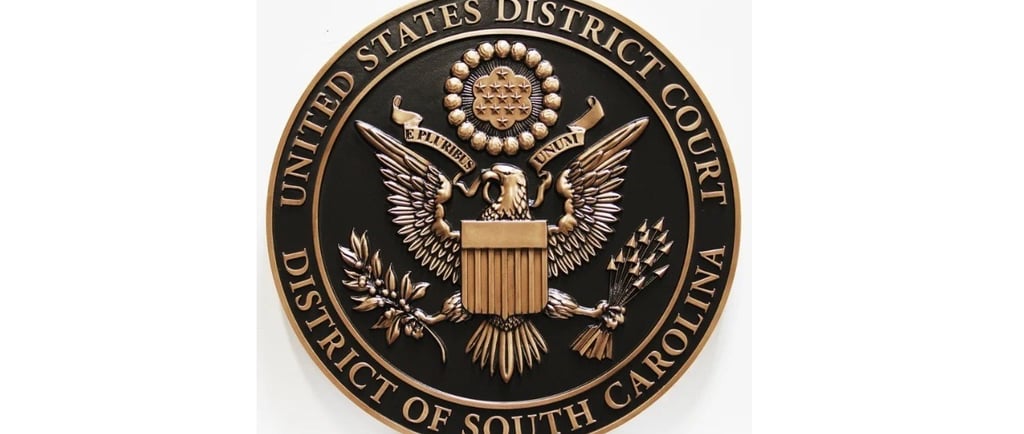Federal Civil Rights Case Alleges “Courthouse Without Law” in Oconee County
Federal lawsuit looks to strip judicial immunity from Judge Singleton of the Oconee County Probate Court and Judge McIntosh of the South Carolina 10th Circuit Court
SOUTH CAROLINA COURTS


A federal civil rights lawsuit filed in the U.S. District Court of South Carolina is pulling back the curtain on what one plaintiff calls a “courthouse without law”—a place where judges act as prosecutor, witness, victim, and jury all at once. The case, Boyle v. Singleton, McIntosh, Logan, and Oconee County, names Probate Judge Danny Singleton, Circuit Judge Lawton McIntosh, attorney Jim Logan, and Oconee County itself in what the complaint describes as a “coordinated campaign of unlawful incarceration, retaliation, and denial of constitutional rights.”
Dr. Jason M. Boyle, a scientist and educator, says he was jailed twice without charges, case numbers, or hearings, and later hit with a gag order that silenced him for criticizing the judges who put him behind bars. “This is not about judicial error,” Boyle’s complaint states. “It is about judicial impersonation and abuse of power.”
A Lobby Becomes a Jail Cell
The saga began on May 29, 2024, when Judge Singleton allegedly confronted Boyle in the courthouse lobby—not in robes, not in open court. Singleton demanded Boyle delete a video critical of the judge. When Boyle refused, deputies who had been pre-positioned for arrest immediately took him into custody.
There was no hearing. No charges. No defense counsel. No case number.
Singleton, Boyle argues, had no jurisdiction. Instead, he acted as a man offended by criticism, wielding contempt powers as a personal weapon. Boyle was sentenced on the spot to 10 days in jail.
Punished Twice for the Same Speech
When Boyle finished serving that sentence, he was hauled back to court in early June—again for the same video. Singleton authored his own Rule to Show Cause, presided over the hearing, and acted as witness and prosecutor against Boyle.
Even though Boyle had been approved for a public defender, he was denied counsel and forced to proceed alone. He was sentenced to 50 additional days, punished twice for the same act in violation of the Double Jeopardy Clause of the Constitution.
Once again, no case number appeared on the orders.
Released—But Not Free
Boyle was released on July 17, 2024, but found his liberty tied to a set of probation-like conditions, despite never being convicted of a crime. The order banned him from owning firearms, restricted interstate travel, and imposed a vague gag order forbidding him to “speak publicly about this case”—without defining what “this case” meant. Boyle appealed the gag order, which should have triggered an automatic stay.
But in Oconee County, the complaint alleges, the rules did not apply.
Secret Emails, Private Investigations, and Retaliatory Contempt
Probate Clerk Maggie Bonadies secretly monitored Boyle’s online posts and passed her reports to Judge Singleton. Singleton then forwarded them to Judge McIntosh—an illegal, off-the-record exchange known as ex parte communication.
On July 22, 2024, McIntosh’s own law clerk sent an email to attorney Jim Logan—Singleton’s personal lawyer—telling him to draft contempt charges against Boyle. This effectively turned Logan, a private attorney, into a prosecutor for the court, something the law does not allow.
A few weeks later, Judge McIntosh threw out one contempt charge, but immediately created a new one on his own initiative. The supposed violation? Boyle had handed out flyers promoting an article that criticized the judges. At the time, the gag order against Boyle was on appeal and legally paused, meaning it wasn’t enforceable.
Even so, McIntosh punished Boyle for protected free speech. Boyle was never given formal notice, access to evidence, or a chance to defend himself.
Constitutional Violations at Every Turn
The complaint alleges sweeping violations of the Bill of Rights:
First Amendment: Retaliation for publishing criticism, recording video, and distributing flyers.
Fourth Amendment: Seizure and incarceration without warrants, case numbers, or charges.
Fifth & Fourteenth Amendments: Double jeopardy, denial of due process, vague gag orders.
Sixth Amendment: Denial of counsel, despite an approved public defender application.
Eighth Amendment: Prolonged, retaliatory confinement amounting to cruel punishment.
Equal Protection: Selective targeting based on speech and association.
The Federal Court Pushback
On August 13, 2025, Magistrate Judge William S. Brown recommended dismissal, citing the Younger abstention doctrine (which prevents federal courts from interfering in ongoing state proceedings), judicial immunity, and the argument that Logan was not a state actor.
But Boyle filed a sweeping set of objections, calling the R&R “a distortion of fact and law.” He argues that contempt hearings conducted without case numbers or prosecutors cannot be considered “ongoing judicial proceedings.” He contends the acts were not judicial at all but retaliatory, administrative, and undertaken “in the clear absence of jurisdiction.”
In his filings, Boyle calls attention to jail records listing him as being held on a “probate hold” with no charges, and to McIntosh’s retroactive assignment of case numbers to sentences already served—an act he describes as a cover-up of jurisdictional voids.
What’s at Stake
Boyle is seeking declaratory and injunctive relief, damages, and a jury trial. But beyond the personal fight, the lawsuit forces a fundamental question:
Can a judge jail a citizen without charges, case numbers, or hearings—and then hide behind judicial immunity?
Boyle insists the answer must be no. “These were not judicial acts,” he writes. “They were acts of raw power outside the law, undertaken in the clear absence of jurisdiction.”
The outcome could determine not only whether Boyle finds justice, but whether Oconee County’s courts will face federal scrutiny for practices that, if true, strike at the heart of constitutional governance.
